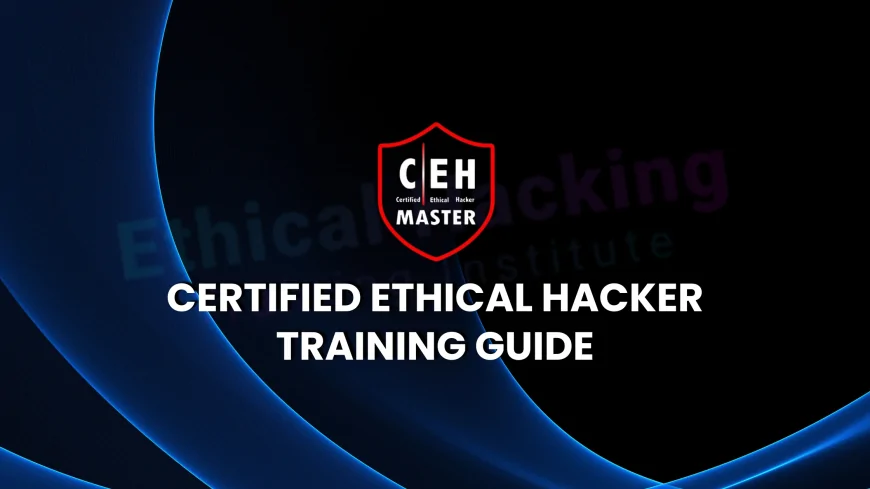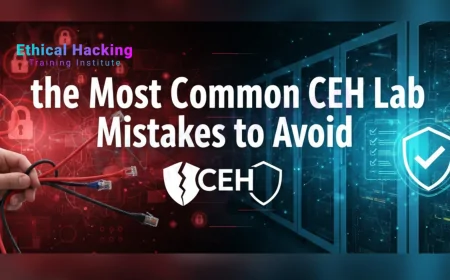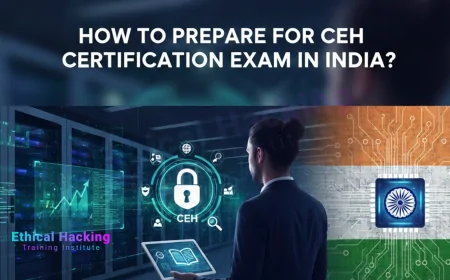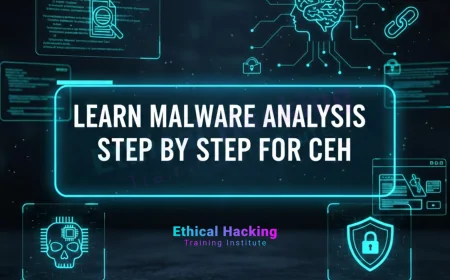Certified Ethical Hacker Course: What to Expect from the Training | Everything You Need to Know About CEH Course Content and Training
Explore what the Certified Ethical Hacker (CEH) course offers, including training modules, tools, hands-on labs, career benefits, and exam insights.

Table of Contents
- Introduction
- What is the CEH Course?
- Why Take CEH Training?
- Course Structure & Modules
- Key Skills You’ll Develop
- Top Tools You’ll Master
- Hands-On Lab Experience
- Training Formats
- Instructor Quality & Support
- Exam Overview & Preparation
- Real-World Readiness
- Career Impact & ROI
- Costs, Packages & Value
- How to Choose a Training Provider
- Post-CEH Career Pathways
- FAQs
- Conclusion
Introduction
The Certified Ethical Hacker (CEH) course is the flagship program from EC‑Council designed to teach aspiring cybersecurity professionals how to think, act, and operate like ethical hackers—but legally and responsibly. Whether you're new to cybersecurity or aiming to sharpen your defensive skills with an offensive mindset, CEH training is transformative.
What is the CEH Course?
CEH is a comprehensive training and certification program covering the methodologies hackers use to infiltrate systems. It spans network mapping, vulnerability scanning, system exploitation, web hacking, malware analysis, wireless attacks, and more. The goal is to equip learners with ethical-offensive tools to anticipate and neutralize threats.
Why Take CEH Training?
Organizational Demand: CEH-certified professionals are in high demand for roles like Penetration Tester, Security Analyst, and Ethical Hacker.
Structured Learning: From theory to labs, the course offers a guided approach far superior to scattered online content.
Brand Recognition: EC-Council’s CEH is globally recognized, adding instant credibility to your profile.
Course Structure & Modules
The CEH syllabus is divided into 20+ modules:
- Intro to Ethical Hacking & Reconnaissance
- Footprinting, Scanning & Enumeration
- System & Network Hacking
- Malware Threats (Trojans, Ransomware, Backdoors)
- Sniffing & Session Hijacking
- Social Engineering & Phishing
- DoS/DDoS Attacks
- Web Application & SQL Injection
- Wireless & Mobile Platform Hacking
- IoT, OT, and Cloud Security Hacking
- Cryptography & Penetration Testing Methodologies
Key Skills You’ll Develop
- Offensive reconnaissance and footprinting
- Exploit development and vulnerability assessment
- Web hacking techniques including XSS & SQLi
- Wireless penetration and sniffing
- Social engineering planning and execution
- Cloud, IoT, and mobile threat analysis
- Ethical hacking methodologies: Recon, Assess, Exploit
Top Tools You’ll Master
Expect to use at least 200–300 industry-standard ethical hacking tools. Highlights include:
- Nmap: Network discovery & mapping
- Metasploit: Automated exploitation framework
- Burp Suite: Web vulnerability interception & testing
- Wireshark: Packet-level network inspection
- John the Ripper: Credential cracking
- Aircrack‑ng: Wireless network penetration
Hands‑On Lab Experience
Quality CEH programs include immersive lab environments (like EC-Council's iLabs), offering:
- Realistic networked infrastructure%
- Attack–defense “red vs blue” CTF challenges
- Virtual machines for testing exploits safely
- Guided walkthroughs and self‑practice lab guides
This practical exposure is crucial — it bridges theory to real-world application.
Training Formats
- Self‑Paced Online: Ideal for flexible learners, with recorded lectures & labs.
- Live Instructor‑Led (Online or Classroom): Structured schedule, interactive Q&A.
- Hybrid: Blends live sessions with recorded content & flexible labs.
Instructor Quality & Support
Expect certified instructors with years of cyber defense/offense experience. Good providers offer:
- Live doubt-clearing sessions
- Dedicated online forums and Slack/Discord groups
- 1:1 mentorship or coaching upon premium programs
Exam Overview & Preparation
The CEH exam is a 4-hour, 125-MCQ test covering all 20 modules. Passing requires a 60–85% score (varies by exam form). Training includes:
- Downloadable assessment quizzes
- Full-length mock exams
- Exam blueprint aligned practice questions
Real‑World Readiness
CEH trains you not just for the exam but for job readiness:
- Simulated penetration exercises
- Report-writing templates and communication drills
- Understanding compliance and ethical guidelines
Career Impact & ROI
CEH holders commonly land these roles:
- Penetration Tester
- Security Analyst / Engineer
- Information Security Officer
- Consultant / Bug Bounty Hunter
In India, typical salary: ₹6–20 LPA. Globally, mid‑career CEH professionals earn ₹30 LPA+.
Costs, Packages & Value
Typical pricing in India:
- Online (self‑paced): ₹25,000–₹35,000
- Instructor‑Led: ₹35,000–₹55,000 (includes labs & exam voucher)
- Premium bundles: ₹55,000–₹75,000 (exam + retake + mentorship)
Global pricing ranges from $1,500 to $3,000 USD delivered similarly.
How to Choose a Training Provider
The right provider makes a difference. Look for:
- EC‑Council accreditation
- Practice lab quality
- Instructor credentials
- Exam voucher and retake policy
- Post‑certification support
Post‑CEH Career Pathways
- CEH (Practical) – hands‑on exam
- ECSA – ethical hacking analyst
- LPT (Licensed Pen Tester)
- OSCP – advanced Pentest
- CHFI – forensic specialization
FAQs
1. What background do I need to take CEH?
Basic networking and OS knowledge help, but EC‑Council training waiver makes it accessible to beginners.
2. How long is the CEH course?
Typically 40–60 hours, spread over 4–8 weeks depending on format.
3. Are lab access and tools included?
Yes, quality programs include virtual labs like iLabs with CEH bundles.
4. Is the CEH exam hard?
With proper training and practice, it’s moderately challenging—mainly conceptual and scenario-based.
5. Can I study CEH online?
Yes—self‑paced and instructor‑led online delivery is widely available.
6. How many attempts are allowed?
One attempt per voucher; many providers include a retake in premium packages.
7. Does CEH expire?
Yes, valid for 3 years. It requires renewal via EC‑Council credits.
8. Which tools are covered?
Over 200 tools, including Nmap, Metasploit, Burp Suite, Wireshark, Aircrack‑ng, etc.
9. Will CEH guarantee a job?
No guarantee, but it enhances your profile for roles like pentesters and security analysts.
10. What is CEH Practical?
A performance‑based exam where you apply ethical hacking in a timed, real‑world simulation.
11. Can I take CEH with no prior experience?
Yes, EC‑Council waivers allow entry-level candidates with official training.
12. How much does CEH cost?
₹30,000–₹75,000 in India, depending on package; $1,500–$3,000 globally.
13. Does CEH require coding?
Basic scripting helps, but extensive coding is not mandatory.
14. Is CEH enough for a pentester?
It's a good foundation; advanced roles typically require CEH Practical, OSCP, or ECSA.
15. What does CEH certification add to my LinkedIn?
Credibility—CEH is a globally respected credential visible to recruiters and peers.
16. Can students do CEH?
Yes, students with relevant training can take CEH via provider waivers.
17. How do I prepare for CEH?
Attend training, use labs extensively, take mock exams, and read the official courseware.
18. Is CEH ethical?
Yes—CEH teaches professional ethics, laws, and responsible disclosure standards.
19. What's the difference between CEH versions?
The difference between CEH v12 and v13 lies in updated tools, enhanced practical labs, and expanded modules focusing on cloud security, IoT, and MITRE ATT&CK framework.
20. What certification should come after CEH?
CEH Practical, ECSA, LPT, OSCP, or CHFI—depending on your career focus.
Conclusion
The CEH course is a thorough, skill-driven gateway into ethical hacking. By equipping you with actionable knowledge, real tools, labs, and ethical frameworks, it primes you for high-impact cybersecurity roles. Whether you're seeking career advancement, skill enhancement, or entry into cyber defense, CEH training is a smart and strategic choice.
What's Your Reaction?
 Like
0
Like
0
 Dislike
0
Dislike
0
 Love
0
Love
0
 Funny
0
Funny
0
 Angry
0
Angry
0
 Sad
0
Sad
0
 Wow
0
Wow
0


















